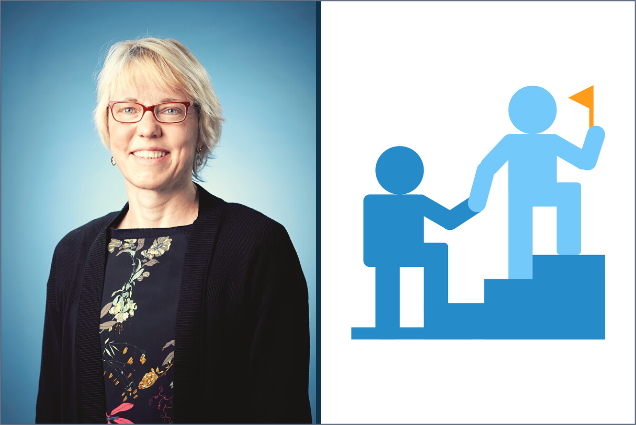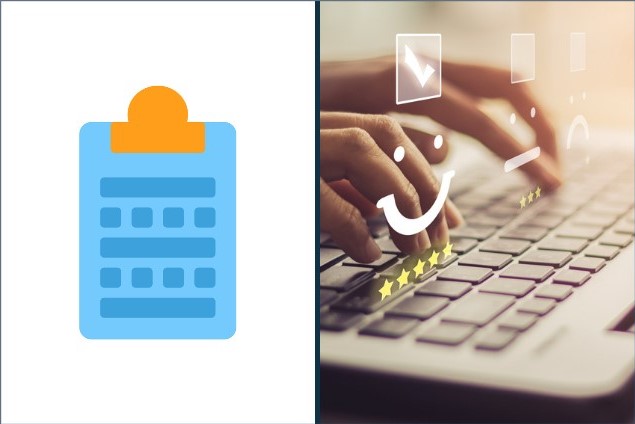To address the challenges of InterNations becoming a remote-first company, our Human Resources Team recently published a Remote Leadership Guide. Even if we’re not team leads or heads of departments ourselves, their insights can help us improve our self-management skills and our general team spirit.
[Read more…] about Why Everyone Benefits from Our Remote Leadership GuideMultiple Choices: How Employee Satisfaction Surveys Can Lift or Lower Morale
… ‘tis the Season — Survey Season!
At InterNations, the summer months aren’t just the perfect time for our team members to relax in a beergarden or on the beach after work. In July and August, it’s also time for the InterNations Barometer.
Our yearly employee satisfaction and engagement survey is currently running for the seventh time since it was established in 2015. Once again, we have the chance to let our employer know how much we love or loathe our working conditions. (Hopefully, the former rather than the latter.) But what’s actually in it for us?
[Read more…] about Multiple Choices: How Employee Satisfaction Surveys Can Lift or Lower MoraleJob Profile: What Does a Frontend Engineer Do All Day?

In the “Job Profiles” series, various members of the InterNations team talk about their role in the company and the work they do at InterNations. In the latest interview, Senior Frontend Engineer Eugene talks about his passion for web development, his own expat experience, and what makes his current job special.
[Read more…] about Job Profile: What Does a Frontend Engineer Do All Day?Remote First: The First 495 Days of Working Remotely for the InterNations Team
In mid-March 2020, the InterNations Team started working from home as a response to the spread of COVID-19. And this temporary change has become a permanent one — going to the office each day will stay a thing of the past for us. This retrospective discusses the reasons behind this fundamental decision and its wide-reaching implications, both the benefits and the challenges. Let’s make remote work work!
For the past 16 months, our more than 100 team members have been working mostly from home. What started as a temporary health and safety measure during the first wave of COVID-19 has led to us rethinking first the way we define workplace and then our entire company culture.
“Of course, we also had official remote-work guidelines before COVID-19. However, our so-called ReFlex Policy mainly applied to employees working from home for a few days per month,” InterNations Founder & Co-CEO Malte explains. “Switching to working remotely every day was a major change for all of us. But we were pleasantly surprised by how quickly and how smoothly our team has adapted to this situation. Since the new way of working has a lot of benefits, we have decided not to return to the status quo once the pandemic is over.”
In this regard, InterNations is part of a larger trend that cuts across companies and organizations, especially in knowledge-intensive white-collar industries: In the latest edition of our annual expat survey, the Expat Insider 2021, nearly half the working respondents (48%) report that their employer has permanently changed their remote-work policy due to COVID-19. And a Deutsche Bank research paper from January 2021 puts it even more simply — its title is “Work from home has come to stay”.
Going Remote First: Our New Working Arrangements
At InterNations, this management decision was also prompted by the results of our annual employee satisfaction survey, the InterNations Barometer. Last year’s data was collected in July and August 2020 when our team had been working remotely for at least four months: 65% of respondents state that they’d like to keep the opportunity to work from home. However, most team members don’t want to do entirely without office life as we know it. The majority of survey participants (77%) would also like to come in two or three times per week in a post-pandemic future.
InterNations acted accordingly, opting for a remote-first model. The new regulations allow more or less all employees of our expat community InterNations (based in Munich) and our relocation service provider InterNations Go! (based in Porto) to work from anywhere in Germany or Portugal, respectively. We can pick and choose if we would like to go back to the office — once the local COVID-19 regulations permit it — if we’d rather prefer working from home for a couple of days per week, or if we want to go fully remote after all.
Does this mean that we’ll all become “digital nomads” and ship the next code update or publish the next blog post from a hammock on the beach? Sadly, the answer is no. This lifestyle, which has become increasingly popular among freelancers, will not be an option for our team members.
“We would have loved to give the InterNations Team this kind of freedom,” Malte says. “But due to the legal situation and the social security system differing from destination to destination, it is simply not possible for our team members to work in a country where they aren’t legally employed.” But anyone who wants to move abroad on a permanent basis is now free to do so — so, a new office near the beach is not entirely out of the question after all. “In this case, we’ll have an Employer of Record draft a new contract for them. This also applies to new international hires who can’t or would prefer not to relocate to Germany or Portugal,” he adds.
Larger Talent Pool, Lower Office Rents: The Benefits for InterNations as a Company
Speaking of international hires: Switching to a remote-first model offers our Human Resources Team far more potential recruiting opportunities. “We don’t want to make any trade-offs when trying to find just the right person for the job. But it’s not always easy to find the perfect candidate who either lives in the Munich area or who’s willing to move here. With our new working arrangements, we have access to a much larger talent pool,” says Christa, the Team Lead Human Resources for our Munich office.
Since both InterNations and InterNations Go! have an international customer base, our corporate language has always been English. New employees don’t have to worry about language barriers in a team that includes around 40 different nationalities from all across the globe. However, international recruiting for a remote-first company poses its own challenges for our HR Team.
“We’ve already updated the profile of our ideal candidate. They need to be both well suited to working outside a traditional office environment and highly motivated to do so. We would like to make sure that our future team members will thrive in a remote-first setting. They should still deliver a strong performance and communicate effectively with their co-workers,“ Christa explains.
On the one hand, an asynchronous work schedule should be possible for those working from outside of Germany or Portugal; on the other hand, team members in selected other time zones still need to be available during core working hours.
“Last but not least, we don’t want to lose all opportunities for personal networking and socializing. As soon as the pandemic is completely under control, we want the entire team to gather once or twice a year, for example, at in-house conferences or team-building events. So, our ideal candidates need a bit of flexibility and the willingness to travel occasionally,” Christa says.
The remote-first policy also means that all team members will no longer be present in the same office building at the same time. InterNations will therefore be introducing a hot-desking system. Team members won’t have their own personal desk anymore, but they will rather get desk space as needed.
“We hope that this prevents the kind of ‘silo syndrome’ where teams don’t share enough information. With a hot-desking policy, employees from different teams can also create a new shared workspace while collaborating on a joint project,” Malte says. “And from a business perspective, hot-desking obviously helps reduce a significant cost factor. We have already been able to save on office space — and thus on rental costs in central Munich.”
And InterNations is far from the only organization to recognize those benefits. In fact, a recent analysis by management consulting firm McKinsey & Company predicts that the rise of hybrid remote work may have important implications for urban economies in general, starting with lower demand for office real estate.
More Flexibility, Less Commuter Stress: The Benefits for the InterNations Team
Even if a perfectly cost-efficient and well-thought-out management decision has been taken, it won’t work in the long run, if it doesn’t meet with the team’s approval. So, what about InterNations becoming a remote-first company? It does seem to be a win-win situation for everyone involved. In last year’s InterNations Barometer, the team members themselves had good things to say about the increased flexibility, the improved work-life balance — especially for employees with family commitments — and the reduction in stress without the daily commute. Four in five respondents (80%) say they prefer working from home to working at the office — more than one in three (35%) even very much so.
“I really like no longer having to spend half an hour on the train before and after work each day,” a survey participant comments. Others also report being able to focus better on their tasks. “Without the many distractions and interruptions at the office, I have actually become more productive,” another team member adds. And yet another respondent highlights that “it’s a lot quieter at home than in the busy city center.” In fact, 93% say that they find working from home at least as efficient as working at the office.
Not Just a Hybrid-Remote Compromise: Remote First as a Level Playing Field
Despite new freedoms and various benefits, building a remote-first company is not all smooth sailing. A hybrid model that makes it possible to choose between working in an office environment and working from home leads to a number of organizational challenges too. The aim should always be to avoid any undue (dis-)advantages arising from a team member’s personal choice. This includes access to information and technical equipment, career development and personal growth, socializing opportunities, and even everyday topics, such as meetings.
Meetings are actually an obvious example. If the majority of our team is sitting in the same conference room, while just a few participants join via videocall from home, the discussion can quickly become unbalanced: the team members at the office will probably dominate the agenda, whereas the remote co-workers may have difficulties contributing. In a remote-first work environment, meetings actually need to be all-remote. Every attendee joins from their own laptop, no matter where they are. That way, all participants are on an equal footing. As this overview of the various stages of remote work puts it: a remote-first company is more than a hybrid-remote compromise. In such an organization, “offices are simply venues to work (remotely) from, instead of being the epicenter of power or culture.“
Smells like Team Spirit: The Challenge of Creating a Remote-First Company Culture
There are other downsides to not being in the same room as our fellow team members. Over the years, respondents in our employee satisfaction survey have described our team and our company culture in very positive terms. The friendly and welcoming office atmosphere has always made teamwork easier and helped our most recent hires to settle in more quickly. Now we have to do without the weekly team breakfasts, the spontaneous lunch dates, or the casual chats in the office kitchen. While the vast majority of participants in the 2020 InterNations Barometer say that the practical aspects of teamwork have not been affected by going remote, it remains to be seen how our team spirit can survive and thrive in a remote-first setting. Especially since the team keeps growing and we keep hiring new members that have never been a part of the “old” InterNations.
“In the short term, we’ve been focusing on providing enough socializing opportunities for our team. So far, we’ve organized several virtual team events — from a Zoom magician to an on-brand version of the popular social deduction game Werewolf — and they’ve generally received positive feedback,” says Head of Content & Communications Kathrin. “But our long-term challenge will be identifying the ‘DNA’ of our company culture and figuring out how exactly to transfer it into a remote-first setting.”
One thing is for sure: We’ll be closely keeping track of what it takes for remote-first work to work.
InterNations Alumni: From Public Relations Manager to Self-Employed PR Consultant
In the “Alumni” series, we talk to former team members about their career change and how working at InterNations has influenced them.
In this interview, we’re talking to Caroline, who has just left the InterNations Team in order to make a long-held dream of hers come true.








